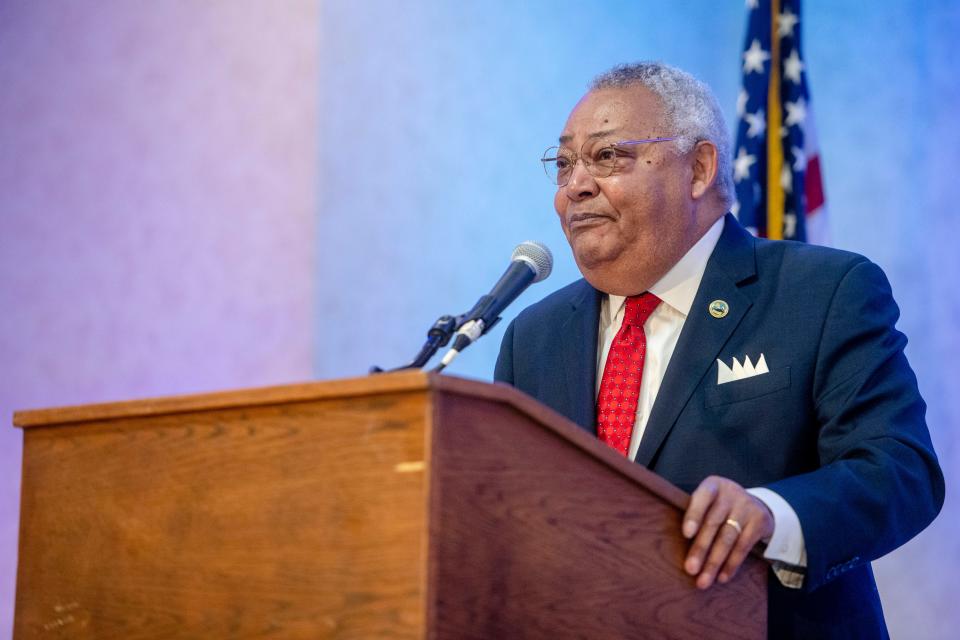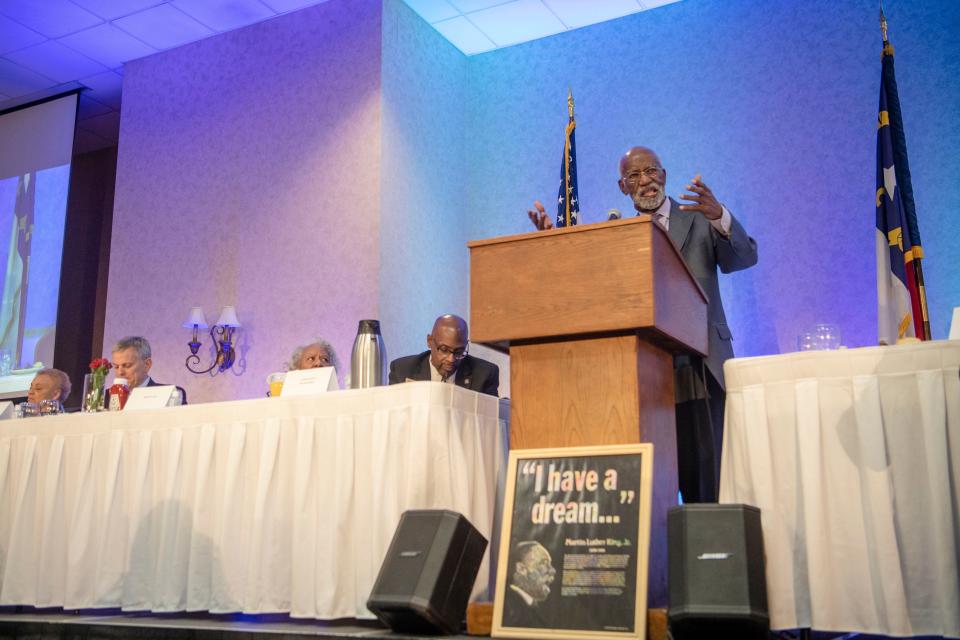Asheville desegregation leader at MLK event: US can afford health care, food for all
- Oops!Something went wrong.Please try again later.
- Oops!Something went wrong.Please try again later.
- Oops!Something went wrong.Please try again later.
ASHEVILLE - Speaking at the start of three-day Martin Luther King Jr. celebration billed as the second-biggest in the country, attorney James "Fergie" Ferguson told the 1,080 prayer breakfast attendees that growing up as a Black youth in the highly segregated city shaped him and his life's work.
As a teenager in the segregated Stephens Lee High School, Ferguson led Asheville toward desegregation, a job he later capped with a lawsuit that forced integration of Asheville City Schools.
From the all-Black Asheville Southside neighborhood, Ferguson, 81, went on to become a renowned trail blazing attorney, representing the famous Wilmington 10 defendants in the 1970s, working in apartheid-era South Africa and more recently representing a Black Asheville pedestrian whose 2017 beating by a police officer drew national condemnation.
Ferguson praised Asheville's reparations program ― which he said while still largely undefined is notable as one of only three in the country ― and said continuing King's legacy meant ensuring "no one was left out" in the United States.
"He knew that America had resources enough to feed the hungry. He knew that America had resources enough to heal the sick and make sure sick people get the resources they need," he said.
Also at the prayer breakfast Ferguson was awarded the state's highest honor, the Order of the Long Leaf Pine, by North Carolina Attorney General and life-long family friend Josh Stein.
Stein, a Democratic candidate for governor whose father started the state's first racially integrated law firm with Ferguson and two other attorneys, said the firm won "pathbreaking civil rights victories" in desegregation, voting rights and other areas, despite their Charlotte law office being destroyed by a fire bomber.
Republican Congressman Chuck Edwards was also at the event, shortly before a scheduled debate in Clay County against primary opponent Christian Reagan. Caleb Rudow, a Democrat running for Edwards' 11th District seat, and a current state legislator, was also present along with many local elected officials.
Speaking at the breakfast was Al Whitesides, the first Black Buncombe County Commissioner who is retiring from the position at the end of his four-year term this year. As a high school student, Whitesides was a member of the groundbreaking ASCORE ― Asheville Student Committee on Racial Equality ― whose first president was Ferguson.

Whitesides listed county accomplishments, including reparations, a nondiscrimination ordinance and "a strategic plan that includes equity not just as a goal but as a foundation."
The holiday weekend's events are sponsored by the Dr. Martin Luther King Jr. Association of Asheville and Buncombe County. The group uses the breakfast to raise college scholarship money for students committed to "anti-racism activism" and "community building" said Jonathan McCoy, master of ceremonies and director of Mars Hill University's Diversity, Equity and Inclusion Center.
An opening prayer by Pastor Mikhail Tikhonov drew reaction from an attendee after Tikhonov asked God to remember Ukraine, saying "Father, we pray for peace in that country." Tzedek Social Justice Fund Director Libby Kyles called out, "We also pray for the people of Gaza. We pray for the people in the Congo. Let's not leave them out."
Introducing Ferguson was Asheville native Liz Colton, a retired journalist and former diplomat who as a student joined Ferguson's desegregation efforts. Colton, who is white, said Ferguson told fellow students about King and Mahatma Gandhi and their work in social activism and nonviolence and helped change they way the students thought.
"I am one of the people who was influenced by James," she said.
Ferguson said Asheville was unusual in the Civil Rights Movement in that there was not a Black university nearby that bred activism. While they sought out adult mentors who were of great help, such as jewelry store owner William Roland, they knew the work should come from them.
"Here we were, children growing up in a city in the South ― and they were all over the South ― where everything you did was determined by race.
"And gradually, gradually we began to see and understand that that had to change but if it was going to change, we had to become a part of that change," he said.

About James "Fergie" Ferguson
Born in 1942 in the Jim Crow South in Asheville's Black Southside neighborhood.
As a student, organized meetings of Black students and white students from different segregated schools to discuss racial issues. Helped form and became president of ASCORE, which helped desegregate Asheville lunch counters, libraries and other public facilities.
Graduated from N.C. Central University in Durham, then law school at Columbia University in 1967.
Married Barbara Turman with whom they had three children. She died in 2022.
In Charlotte formed first racially integrated law firm with Julius Chambers, James Lanning and Adam Stein, father of Josh Stein.
In 1970 successfully sued Asheville City Schools over lack of desegregation, 16 years after the U.S. Supreme Court case Brown v. Board of Education officially ended public school segregation.
Defended the Wilmington 10 in 1971, a group of Black men charged with arson and conspiracy. Forty years later gained pardons of innocence for each.
Got reduction of the death sentences to life imprisonment for the four people whose cases were decided under N.C. Racial Justice Act, the only law of its kind in the nation.
Co-founded South Africa’s Trial Advocacy Program for Black and white lawyers during Apartheid.
Represented Johnnie Rush, a Black resident who was beaten, shocked and choked in 2017 by an Asheville police officer after a jaywalking incident. Bodycam video published by the Citizen Times spurred outrage, with the officer pleading guilty to felony assault and Rush winning a $650,000 settlement from the city.
Taught as lecturer at Harvard Law School and N.C. Central. Member of Inner Circle, group of 100 best plaintiff’s lawyers in country.
More events
Candlelight service: 5:30 p.m. Jan. 14, Trinity Episcopal Church, 60 Church St., Asheville. A service to honor those that have dedicated themselves to the cause of social justice. Visit https://mlkasheville.org.
Peace March and Rally: 11:30 a.m. service Jan. 16 at St. James AME Church, 44 Hildebrand St. March to Pack Square at 12:30 p.m., rally at 1 p.m. Bring nonperishable food items to the Church to be distributed between MANNA FoodBank and East End Valley Street Neighborhood Food Pantry. Visit https://mlkasheville.org.
More: Martin Luther King Jr. Day events around Asheville area 2024
'Green Book' exhibit features Asheville places safe for 20th century Black travelers
More: 'Mile-long museum': New Asheville heritage trail tells the history of Black Ashevillians
Editor's note: This story has been updated with the correct name of the presenter of the invocation, Pastor Mikhail Tikhonov. An earlier version named the pastor listed in the program, who was unable to attend.
Joel Burgess has lived in WNC for more than 20 years, covering politics, government and other news. He's written award-winning stories on topics ranging from gerrymandering to police use of force. Got a tip? Contact Burgess at jburgess@citizentimes.com, 828-713-1095 or on Twitter @AVLreporter. Please help support this type of journalism with a subscription to the Citizen Times.
This article originally appeared on Asheville Citizen Times: Asheville desegregation leader at MLK event: health care, food for all

